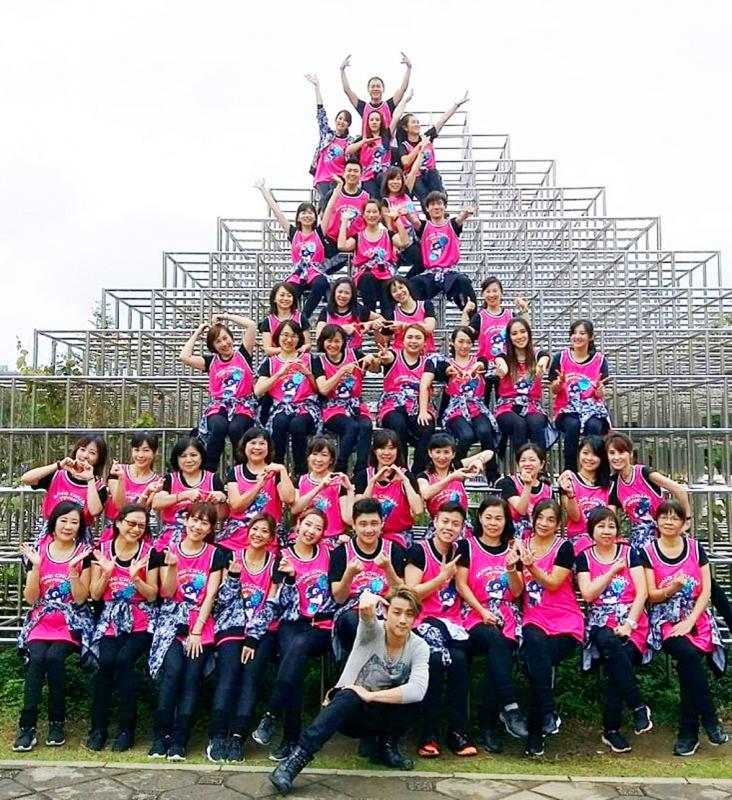It’s hard to criticize an ultra-heartwarming documentary about an energetic cheerleading squad comprised mostly of working women in their 40s and 50s. Lala Every You (老娘就要這麼活) is undoubtedly an inspiring tale, as these ordinary people leave their comfort zone and achieve way more than they had expected. The footage of middle-aged ladies screaming and laughing while standing on the top of a cheerleading pyramid for the first time is pure gold.
Eight years in the making, the film focuses mostly on Ming Chuan University’s (銘傳大學) alumni cheerleading team preparing for their alma mater’s 60th anniversary celebration in 2017, capturing their practices, team building exercises, meetings and other activities with endless playful banter.
They’re an exuberant group despite the age differences between the members, and they enthusiastically laugh, joke and dance their way pretty much through the entire film, obviously having lots of fun. Their zest is bolstered by personal interviews and black screens with inspirational quotes such as “As long as you’re willing to try and give your all, it’s never too late.”

Photo courtesy of atmovies.com
And that is the problem: everything is presented in such an upbeat, relentlessly positive manner — including the dance-powered soundtrack with frenetic beats and electric guitar solos — but it is conflict and tension that makes a story truly gripping. Some of the subjects do talk about drama, such as minor squabbles or school rivals from decades ago meeting again on the team, but these tidbits don’t carry much weight.
Perhaps that’s what Lala Your Life is meant to be: a feel-good story about a group of hard-working, fun-loving people who by society’s standards should be well past their cheerleading prime. As director and squad founder Ivy Chu (朱岩蘭) says in the film, she was not looking to form a skilled cheerleading team. Chu just wants to provide an opportunity for people to try things they didn’t think possible.
Chu, 50, seems to live by that motto, as this is the former flight attendant’s first production with no prior experience in documentary filmmaking. That’s something that should always be applauded and encouraged, especially in a society that places much importance on behaving according to certain standards. Chu pushes her squad members to let that go. Out of shape? Too old? No coordination? It doesn’t matter.

Photo courtesy of atmovies.com
However, it’s tricky making a documentary about oneself and one’s organization. As the founder, Chu is undoubtedly the heart and soul of the team, complete with a compelling backstory that would make her the ideal main subject. Of course, each character has a tale worth telling — the mother who participates with her teenage daughter with Down syndrome, the 38-year-old rock musician who becomes one of the few men on the squad — but the story would definitely benefit from a strong central character.
Chu does play that role to a certain extent, narrating parts of the story and providing her insights on how the women have transformed over eight years on the team. But perhaps in a conscious effort to emphasize the team, or to avoid seeming too egocentric, Chu pushes her own story to the very end of the film, when suddenly the mood changes after the final performance in Kinmen.
Only then, in the last 10 minutes, does the audience learn of some of Chu’s biographical details such as how she was laid off from her job and participated in the Japan Airlines flight attendant protests in 2010. Looking for something to fill the void, she visited her alma mater and saw the cheerleading team practicing, leading her to start calling alumni to kickstart her venture. This is absolutely crucial information that should have been revealed much earlier, which would provide some of the sorely lacking tension to the documentary.
And that’s not all. There’s a rich trove of poignant and reflective moments in that last bit that would have improved the storyline if emphasized earlier. A lot of the dancing scenes, which begin to feel repetitive after a while, could have been cut short or removed to make way for this element.
Instead, the audience is left with a quite straightforward journey — which doesn’t mean that the story isn’t worth telling, it’s just that it could have been more.

On April 26, The Lancet published a letter from two doctors at Taichung-based China Medical University Hospital (CMUH) warning that “Taiwan’s Health Care System is on the Brink of Collapse.” The authors said that “Years of policy inaction and mismanagement of resources have led to the National Health Insurance system operating under unsustainable conditions.” The pushback was immediate. Errors in the paper were quickly identified and publicized, to discredit the authors (the hospital apologized). CNA reported that CMUH said the letter described Taiwan in 2021 as having 62 nurses per 10,000 people, when the correct number was 78 nurses per 10,000

As we live longer, our risk of cognitive impairment is increasing. How can we delay the onset of symptoms? Do we have to give up every indulgence or can small changes make a difference? We asked neurologists for tips on how to keep our brains healthy for life. TAKE CARE OF YOUR HEALTH “All of the sensible things that apply to bodily health apply to brain health,” says Suzanne O’Sullivan, a consultant in neurology at the National Hospital for Neurology and Neurosurgery in London, and the author of The Age of Diagnosis. “When you’re 20, you can get away with absolute

May 5 to May 11 What started out as friction between Taiwanese students at Taichung First High School and a Japanese head cook escalated dramatically over the first two weeks of May 1927. It began on April 30 when the cook’s wife knew that lotus starch used in that night’s dinner had rat feces in it, but failed to inform staff until the meal was already prepared. The students believed that her silence was intentional, and filed a complaint. The school’s Japanese administrators sided with the cook’s family, dismissing the students as troublemakers and clamping down on their freedoms — with

As Donald Trump’s executive order in March led to the shuttering of Voice of America (VOA) — the global broadcaster whose roots date back to the fight against Nazi propaganda — he quickly attracted support from figures not used to aligning themselves with any US administration. Trump had ordered the US Agency for Global Media, the federal agency that funds VOA and other groups promoting independent journalism overseas, to be “eliminated to the maximum extent consistent with applicable law.” The decision suddenly halted programming in 49 languages to more than 425 million people. In Moscow, Margarita Simonyan, the hardline editor-in-chief of the